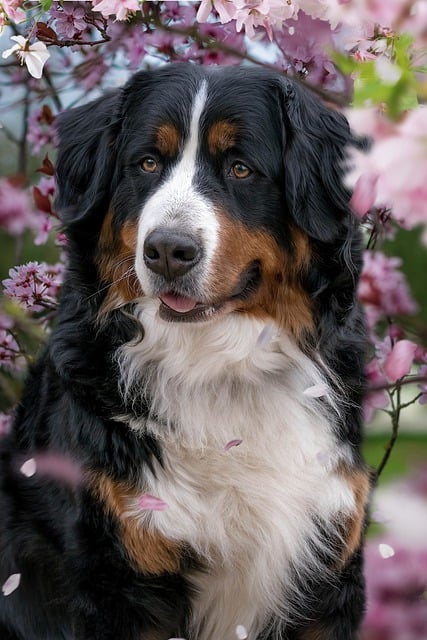


The Bernese Mountain Dog, or Bernese, is a large, sturdy, and affectionate breed originally from the Swiss Alps. Known for their striking tri-color coat, these dogs are gentle, loyal, and good-natured, making them excellent companions for families. Bernese Mountain Dogs are part of the working group, historically bred to herd cattle, pull carts, and perform farm tasks. They are calm and reliable, yet playful and friendly with children and other pets, making them an ideal choice for homes with enough space for such a large breed.
The Bernese Mountain Dog originates from the Bernese Oberland region in Switzerland, where they were used as versatile farm dogs. Their primary role was to herd cattle, guard property, and pull carts full of goods to and from the market. These dogs were bred by crossing the local farm dogs with larger breeds like the Mastiff. The Bernese Mountain Dog became known for its strength, endurance, and intelligence. The breed's popularity began to grow in the late 19th century and continues today as a beloved family dog and working companion. Despite their Swiss origins, Bernese Mountain Dogs were introduced to other parts of the world in the 20th century, where they quickly gained popularity.
The Bernese Mountain Dog is a large, muscular dog with a well-balanced, strong build. They typically stand between 23 to 28 inches tall at the shoulder and weigh between 70 to 115 pounds, with males generally being larger than females. The most striking feature of the breed is its beautiful tri-color coat, which consists of black, white, and tan. Their thick double coat is dense and weather-resistant, designed to protect them from the cold mountain climates. The Bernese has a broad head, dark eyes, and a friendly expression. Their long, bushy tail is often carried in a slight curve, and their ears are medium-sized and triangular, hanging close to the head.
Bernese Mountain Dogs are known for their calm, gentle, and affectionate nature. They are typically very good with children and make excellent family pets. Despite their size, they are not overly aggressive and tend to be friendly and easygoing. They are loyal and often form strong bonds with their families, making them excellent companions. Although they are generally calm indoors, they are still playful and enjoy spending time with their loved ones. While they are known for their docile temperament, they can be protective of their family and home when needed. Early socialization is essential to ensure they are well-rounded and comfortable with other pets and strangers.
While Bernese Mountain Dogs are calm and patient indoors, they still require regular exercise to maintain their health and prevent boredom. Moderate daily exercise, such as walks, playtime in the yard, or hikes, is necessary to keep them fit and happy. They enjoy outdoor activities, and their strong build makes them good at tasks like pulling carts or carrying light loads. However, due to their large size and relatively low energy level compared to other breeds, they do not require intense exercise but do benefit from mental stimulation and outdoor time. Care should be taken not to over-exercise them while they are puppies to prevent joint problems as they grow.
Bernese Mountain Dogs are intelligent and eager to please, making them relatively easy to train. However, their large size and calm demeanor mean that they can sometimes be slow to mature and may need more patience compared to smaller breeds. Early socialization is crucial to help them become well-adjusted and comfortable in different environments. They are generally good with children, other dogs, and pets, but it is essential to expose them to various situations, people, and animals early in life. Positive reinforcement, including praise and treats, works best for training them, and they tend to respond well to consistency and leadership. Due to their gentle nature, Bernese may not excel in tasks that require independent decision-making, but they do well in obedience training and tasks that require cooperation with their handler.
Bernese Mountain Dogs are generally healthy but can be prone to certain genetic health issues, such as hip dysplasia, elbow dysplasia, and certain types of cancers. Regular veterinary check-ups and maintaining a healthy weight are essential for keeping them healthy. Their thick double coat requires regular grooming to prevent matting, particularly during shedding seasons. Weekly brushing is recommended, along with occasional baths to keep their coat clean and shiny. The long ears should be checked regularly for signs of infection, and their nails should be trimmed regularly to maintain their overall health. Bernese are also prone to heat sensitivity due to their dense coats, so they should not be over-exercised in hot weather.
The average lifespan of a Bernese Mountain Dog is between 7 to 10 years, which is relatively short compared to other breeds. This is partly due to their size, as larger dogs generally have shorter lifespans. However, with proper care, a balanced diet, regular exercise, and routine veterinary check-ups, they can live longer, happier lives. Keeping them at a healthy weight and monitoring for common health issues can help extend their lifespan. Early detection of health problems can also contribute to a better quality of life for this beloved breed.
© copyright Dog Compendium 2024 - 2026